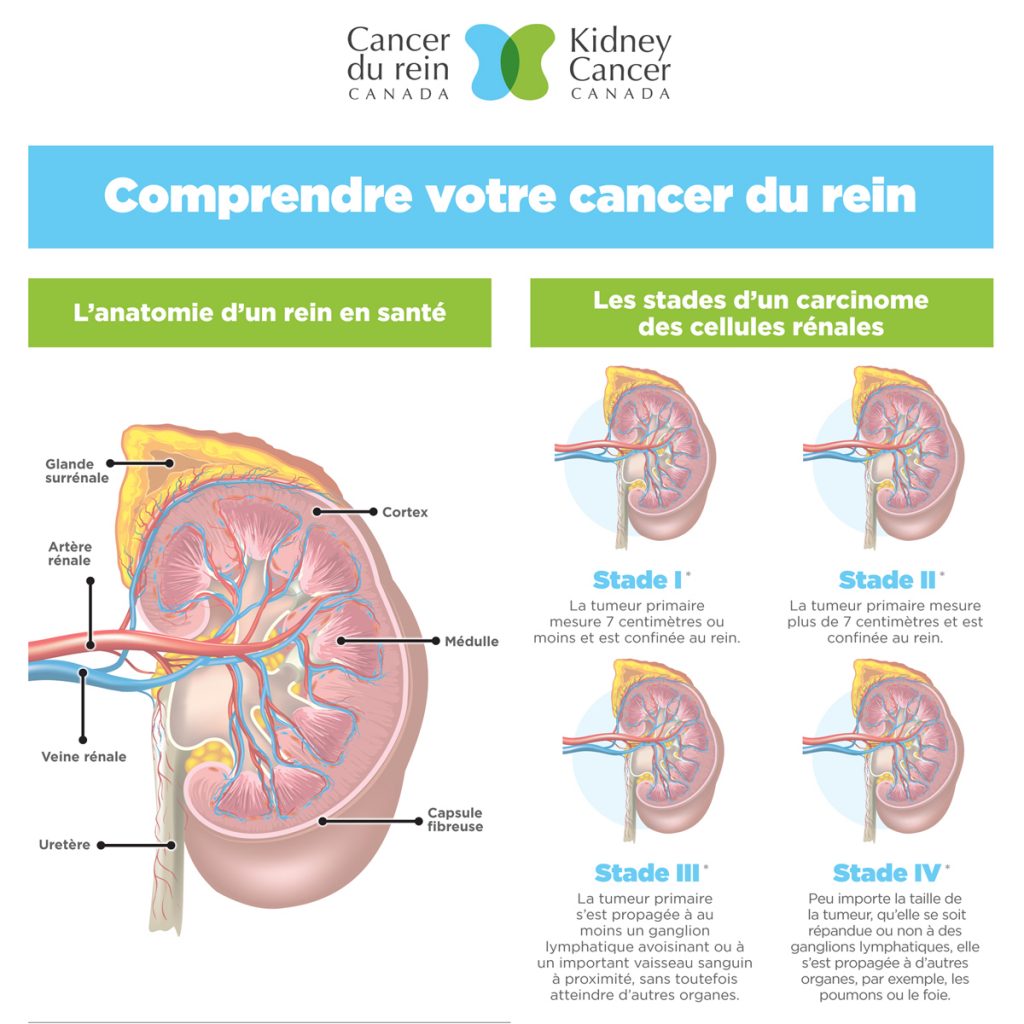After explaining the results of your assessment, the genetics specialist may recommend you have testing to check for a genetic abnormality linked to kidney cancer.
GENETIC TESTING MAY BE SUGGESTED, ESPECIALLY IF YOU HAVE:
- A kidney tumour, noncancerous (benign) or cancerous, and one of the following:
- Many tumours in one kidney (multifocal tumours) or tumours in both kidneys (bilateral tumours),
- Diagnosed with kidney cancer at an early age, especially 45 years of age or younger,
- A close relative with any type of kidney tumour,
- Conditions related to one of the hereditary kidney cancer syndromes, such as skin conditions, many uterine fibroids at a young age, pheochromocytoma, paraganglioma, or blood vessel tumours (called hemangioblastomas) of the eye, brain or spinal cord,
- A personal history of another cancer outside of the kidney.
- Non-clear cell cancer of the kidney with unusual features, such as papillary, chromophobe, oncocytic, or a combination of these tumours (called mixed or hybrid tumours).
- A family member with a known diagnosis of any one of the hereditary kidney cancer syndromes including Von Hippel-Lindau syndrome, Birt-Hogg-Dube syndrome, hereditary leiomyomatosis and renal cell carcinoma, hereditary papillary kidney cancer, hereditary paraganglioma and phoechromocytoma syndrome, tuberous sclerosis complex, BAP-1 associated kidney cancer or Cowden syndrome. Of note, even if you do not have kidney cancer but have a family member with one of these above conditions, it may still be recommended that you have a genetic assessment.
It will still be up to you to decide whether or not you want to have genetic testing. If you do choose to have testing, the genetics professional will explain the results to you.
DEPENDING ON YOUR RISK OF DEVELOPING KIDNEY CANCER, YOUR DOCTOR MAY SUGGEST THAT YOU:
- Have regular checkups or tests to look for kidney cancer, which might include physical examinations, blood tests or imaging tests, such as ultrasounds or MRIs. These may be started at a young age or done more frequently than for people in the general population.
- Take steps to help reduce the risk of kidney cancer, by making healthy lifestyle choices.
- These recommendations may be made with or without genetic testing.
Sometimes when people with known genetic conditions are planning a family, they want to know if a child has inherited the gene mutation. Prenatal tests are available at various stages of pregnancy for couples who are interested in knowing this information. For couples who are not willing to take the chance of having a child with one of these conditions, in vitro fertilization (IVF) with preimplantation genetic diagnosis (PGD) may be an option. In some instances, genetic testing can be performed on embryos created through IVF, with only those embryos not having the condition being implanted back into the woman’s womb (uterus). There are risks and benefits associated with all of these choices and there may be some costs associated with these procedures. Genetic counsellors are the ideal healthcare professionals to provide potential parents with information about these tests.
SECTION REFERENCES:
Canadian Cancer Society. Genetic Testing. 2016.
Hampel H, Bennett RL, Buchanan A, et al. A practice guideline from the American College of Medical Genetics and Genomics and the National Society of Genetic Counselors: referral indications for cancer predisposition assessment. Genetics in Medicine. 2015; Jan;17(1):70-87.
Ho TH, Jonasch E. Genetic Kidney Cancer Syndromes. Journal of the National Comprehensive Cancer Network. 2014; September;12(9):1347-1355.
Lattouf JB, Pautler SE, Reaume MN, Eva ,et al. Structured assessment and followup for patients with hereditary kidney tumour syndromes. Canadian Urological Association Journal. 2016; 10(7-8):E214-22.
National Cancer Institute. Genetic Testing for Hereditary Cancer Syndromes. 04/11/2013.
National Cancer Institute. Genetics of Kidney Cancer (Renal Cell Cancer) (PDQ®) – Health Professional Version. Updated: 10/13/2016.
Reaume MN, Graham GE, Tomiak Eva, et al. Canadian guideline on genetic screening for hereditary renal cell cancers. Canadian Urological Association Journal. 2013; 7(9-10):319-323.
U.S. National Library of Medicine. Genetics Home Reference: Your Guide to Understanding Genetic Conditions. Help Me Understand Genetics. Published: 12/1/2016.



























































